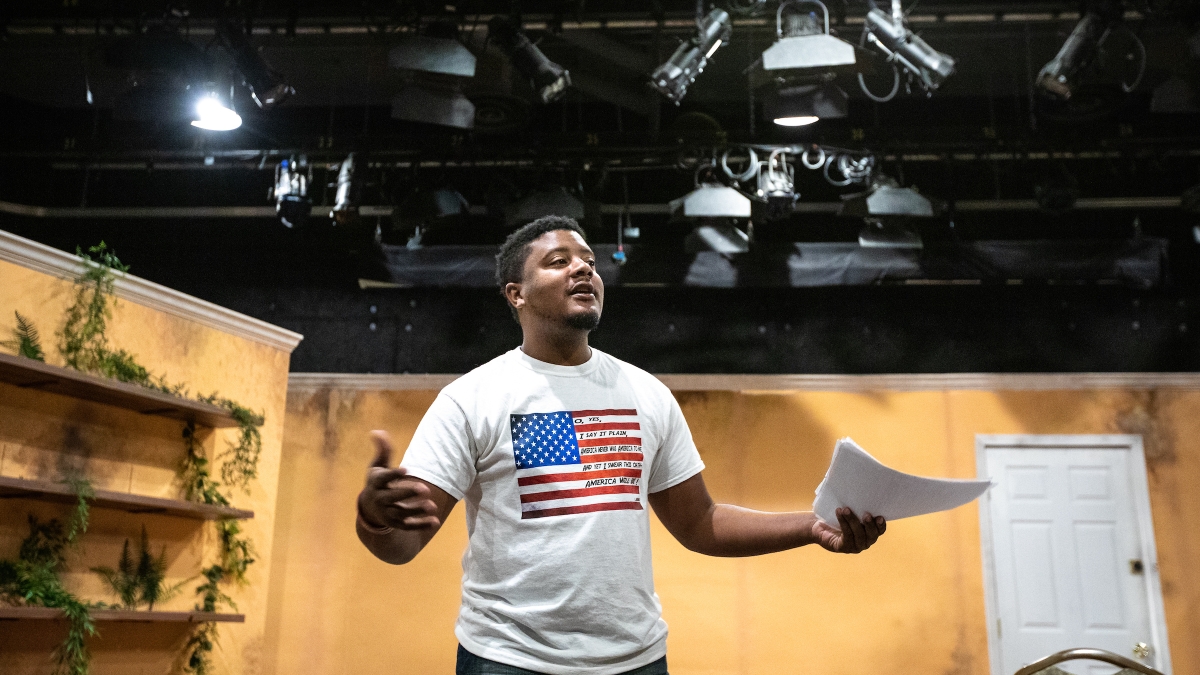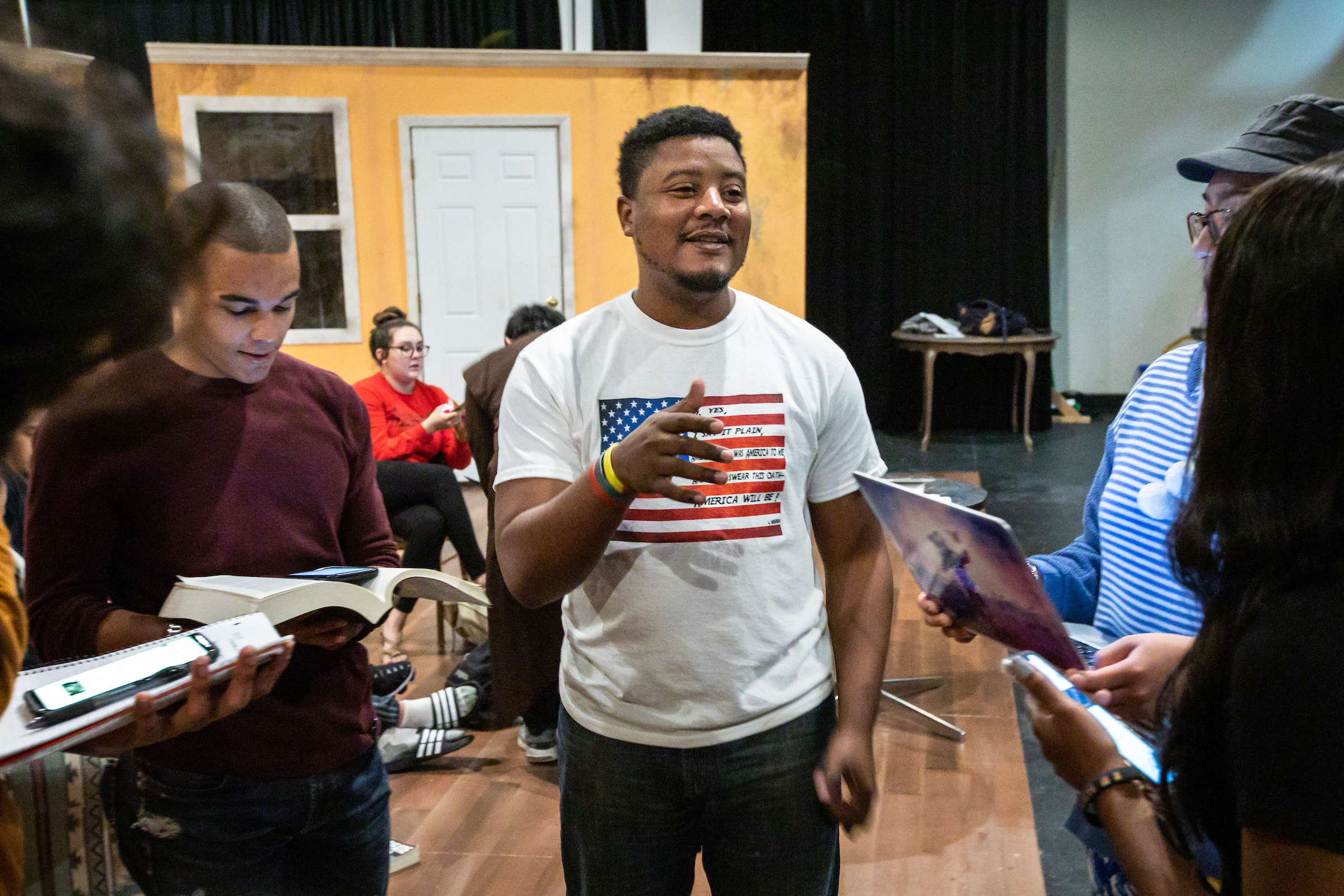Dontá McGilvery has devoted his life to finding people who live at the margins of society and giving them a voice through theater.
“Performance has the power to transform,” he tells his class.
And he’s harnessing that power in many ways to tell stories.
McGilvery is pursuing a PhD in theater for youth at Arizona State University and was recently honored with ASU’s 2019 Martin Luther King Jr. Student Servant-Leadership Award. Several years ago, he started a nonprofit in his hometown of Dallas to help people who are homeless — an issue he learned about firsthand after living in their community for a year. After coming to ASU in 2017, he co-founded a community theater group, and this semester, he launched a course on African-American theater for undergraduates.
“I noticed that in my own classes, we didn’t talk much about African-Americans’ contributions to the field of theater so I began studying it on my own, and then I would include it in class,” he said. “Often, there were things that the students and even the professors didn’t know.”
So he reached out to the School of Film, Dance and Theatre in the Herberger Institute for Design and the Arts to ask about teaching African-American theater, and he received enthusiastic approval.
“What my students like is learning about something they never heard of, in all of their education,” he said. “To me, that’s encouraging.”
So far this semester, the class has covered the genre of plays about lynchings, including “A Sunday Morning in the South,” written by Georgia Douglas Johnson in 1925.
“If we understand that in the 1920s, there were black playwrights who wrote anti-lynching plays to combat what was happening at that time, the class can connect that with what’s happening today with black and brown bodies having their lives taken by police,” he said.
The students have learned about the connection among African-American artists, including the play “A Raisin in the Sun” by Lorraine Hansberry, whose title comes from the poetry of Langston Hughes.
“It’s a diverse group of students, and we’re talking about things that the African-American students can identify with and then lead the discussion,” he said.
The class studied the 1916 play “Rachel,” by Angelina Grimke, about a young black woman who, overcome by the horrors of racism, vows never to have a child. That was especially poignant to Leslie Campbell, a senior who’s in the class.
“It deals with the fragility of the black woman and the black woman’s negotiation of herself in white society in the early 1900s and particularly the black mother’s desire to protect the black child’s innocence, which I think is a struggle that rings true even today,” said Campbell, who is from the Bahamas and is majoring in theater and global health.
“In this class, I’ve appreciated being able to share the knowledge that I learned growing up in the islands and our history with slavery, and then being able to relate this information to my African-American and non-black counterparts and having them say, ‘I didn’t even think about that,’” she said.
“Dontá takes the time to break down the dynamics of how these systems work and to see how it’s being played out even today.”
Dontá McGilvery works with a group of students in the undergraduate class he teaches on African-American theater in the Nelson Fine Arts Center on the Tempe campus. Photo by Charlie Leight/ASU Now
McGilvery said that he’s always pursuing one goal: “I’m trained to see that when you read a text or enter a space, the first thing you want to spot is whose voice is absent from the narrative and then investigate why.”
That helped lead to the Sleeveless Acts Drama Company, which he started in 2017 with fellow student Claire Redfield, who is pursuing a Master of Fine Arts in theater for youth. Their idea won an entrepreneurship grant from the Herberger Institute for Design and the Arts.
“We had this idea of starting a theater company that amplifies voices in marginalized communities, telling their stories using drama,” he said.
“We tear away the sleeves that keeps people’s history hidden.”
Last year, the company created a production about African-American history featuring a cast that ranged in age from 13 to 70, he said. Currently, they’re working on staging a performance later this spring to celebrate Eastlake Park in Phoenix, a historic center of the city’s African-American community.
“Everything we do, we like it to be performative and for healing,” he said.
The company also performs in churches in central and south Phoenix, a mission that is central to McGilvery, who also is a minister.
It was his personal faith journey that led him to make a startling decision eight years ago, when he was in graduate school at Southern Methodist University: He gave away all his possessions and lived for a year with people who were homeless.
“It was important that I took on that project because of my spiritual calling as a minister,” he said. “I understood Jesus was homeless, and I wanted to understand why he decided to live a homeless life and, by being homeless, how could it give me a different perspective on the world.”
He found that the homeless were friendly, supportive of each other and, usually, regular people who came upon hardship.
“The first day I was homeless, I didn’t know how to start, so I just went downtown and laid down on the sidewalk to go to sleep,” he said. “And another homeless guy named Robert tapped me on the shoulder and walked me to the shelter. He told me how he fell on hard times.”
McGilvery spent his nights in a shelter, but because his grad school classes were in the evenings, all the beds were filled by the time he arrived, so he slept in a chair in the overflow room.
In conjunction with living on the streets, McGilvery started a nonprofit called the Dallas Improvement Association, which recruited volunteers to experience homelessness for short periods, as well as helped homeless people with donations and meals.
“We didn’t go to the shelter — we went to those people who were strung out and wouldn’t go to a shelter,” he said. “We were always searching for the most voiceless within the group that has no voice.”
When the year was up, it was hard to leave his friends and transition back to a more typical life.
“My heart is now more compassionate to the people who suffer the most. When I drive in my car and see someone on the corner, I wonder, ‘What is their story?’
“And I look at the other cars and wonder about the assumptions those people put on them.”
McGilvery’s work drew attention. He spoke at a conference held by the U.S. Army Corps of Engineers, which later partnered with the Dallas Improvement Association and donated more than 1,000 computers to low-income schools. He also spoke at a U.S. Army War College security seminar about his experiences.
“I talked about how homeless people are marginalized and how cities are intentionally pushing them to the side,” he said.
Eventually, McGilvery would like to be a professor of theater, but he has a few years left in his doctoral program.
As he continues his outreach, one memory stays with him: When he was an undergrad, he was riding a bus and sat near a man who was a drug user. The man started asking McGilvery questions about being a student. He said, “Do you want to get a PhD?”
“I was like, ‘Sure, if it comes around.’ He said, ‘If you become a doctor, just make sure you actually heal someone.’
“And I thought that was profound. It’s about, ‘What am I doing to bring about healing in society and in individuals?’ ”
He has never forgotten that interaction.
“That kick-started my passion for justice and speaking for the voiceless.”
Top image: Dontá McGilvery, a doctoral student in the theater for youth program at ASU, has launched a course on African-American theater this semester and also co-founded a community theater company. Photo by Charlie Leight/ASU Now
More Health and medicine

New initiative aims to make nursing degrees more accessible
Isabella Koklys is graduating in December, so she won’t be one of the students using the Edson College of Nursing and Health Innovation's mobile simulation unit that was launched Wednesday at Arizona…

Reducing waste in medical settings
Health care saves lives, but at what cost? Current health care practices might be creating a large carbon footprint, according to ASU Online student Dr. Michele Domico, who says a healthier…

ASU offers bilingual counseling to Spanish speakers
Arizona is one of the five states in the nation with the highest percentage of Hispanic residents, according to the U.S. Department of Health and Human Services Office of Minority Health, and …



